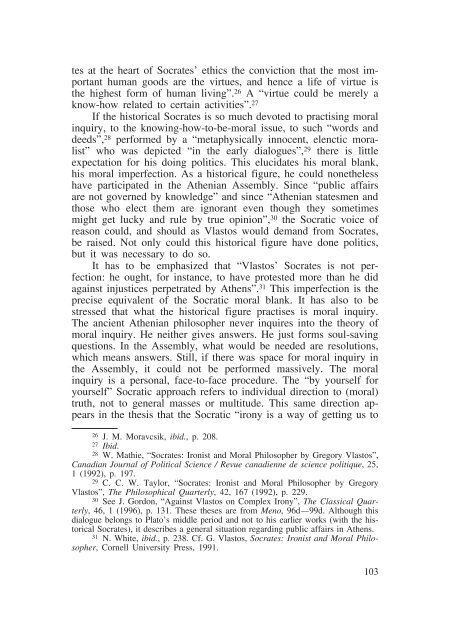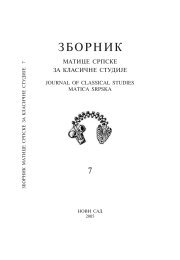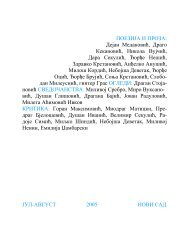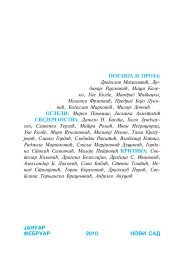You also want an ePaper? Increase the reach of your titles
YUMPU automatically turns print PDFs into web optimized ePapers that Google loves.
tes at the heart of Socrates' ethics the conviction that the most important<br />
human goods are the virtues, and hence a life of virtue is<br />
the highest form of human living". 26 A “virtue could be merely a<br />
know-how related to certain activities". 27<br />
If the historical Socrates is so much devoted to practising moral<br />
inquiry, to the knowing-how-to-be-moral issue, to such “words and<br />
deeds", 28 performed by a “metaphysically innocent, elenctic moralist"<br />
who was depicted “in the early dialogues", 29 there is little<br />
expectation for his doing politics. This elucidates his moral blank,<br />
his moral imperfection. As a historical figure, he could nonetheless<br />
have participated in the Athenian Assembly. Since “public affairs<br />
are not governed by knowledge" and since “Athenian statesmen and<br />
those who elect them are ignorant even though they sometimes<br />
might get lucky and rule by true opinion", 30 the Socratic voice of<br />
reason could, and should as Vlastos would demand from Socrates,<br />
be raised. Not only could this historical figure have done politics,<br />
but it was necessary to do so.<br />
It has to be emphasized that “Vlastos' Socrates is not perfection:<br />
he ought, for instance, to have protested more than he did<br />
against injustices perpetrated by Athens". 31 This imperfection is the<br />
precise equivalent of the Socratic moral blank. It has also to be<br />
stressed that what the historical figure practises is moral inquiry.<br />
The ancient Athenian philosopher never inquires into the theory of<br />
moral inquiry. He neither gives answers. He just forms soul-saving<br />
questions. In the Assembly, what would be needed are resolutions,<br />
which means answers. Still, if there was space for moral inquiry in<br />
the Assembly, it could not be performed massively. The moral<br />
inquiry is a personal, face-to-face procedure. The “by yourself for<br />
yourself" Socratic approach refers to individual direction to (moral)<br />
truth, not to general masses or multitude. This same direction appears<br />
in the thesis that the Socratic “irony is a way of getting us to<br />
26 J. M. Moravcsik, ibid., p. 208.<br />
27 Ibid.<br />
28 W. Mathie, “Socrates: Ironist and Moral Philosopher by Gregory Vlastos",<br />
Canadian Journal of Political Science / Revue canadienne de science politique, 25,<br />
1 (1992), p. 197.<br />
29 C. C. W. Taylor, “Socrates: Ironist and Moral Philosopher by Gregory<br />
Vlastos", The Philosophical Quarterly, 42, 167 (1992), p. 229.<br />
30 See J. Gordon, “Against Vlastos on Complex Irony", The Classical Quarterly,<br />
46, 1 (1996), p. 131. These theses are from Meno, 96d—99d. Although this<br />
dialogue belongs to Plato's middle period and not to his earlier works (with the historical<br />
Socrates), it describes a general situation regarding public affairs in Athens.<br />
31 N. White, ibid., p. 238. Cf. G. Vlastos, Socrates: Ironist and Moral Philosopher,<br />
Cornell University Press, 1991.<br />
103

















